Imagine being trapped in a never-ending cycle where you can't stop picking at your skin, even when it causes visible damage and significant distress.
This isn't just a bad habit or occasional behavior; it's a mental health disorder known as Skin Picking Discoder, which can profoundly affect your life.
This condition is not merely a matter of willpower or vanity but is rooted in a complex interplay of psychological and neurological factors.
Fortunately, effective treatments are available to help people with this condition regain control of their lives and find relief from this challenging mental health condition.
What Is Dermatillomania?
Dermatillomania, also known as Skin-Picking Disorder is a condition where someone can't stop picking or scratching their skin, which often leads to injuries and scars. It's also called excoriation disorder or skin-picking disorder and is a type of obsessive-compulsive disorder (OCD). When the picking causes a lot of scarring and injuries, it can really impact a person's mental health, well-being, and daily life.
Is Skin Picking a Sign of OCD?
Yes, skin picking can be a sign of Obsessive-Compulsive Disorder (OCD), but it’s not always the case. It is often confused by just being related to OCD because of the obsessions and compulsions involved. However, not all individuals with skin-picking behavior have OCD. Dermatillomania can occur on its own or alongside other mental health conditions like body dysmorphic disorder (BDD), stress, or trichotillomania (hair-pulling disorder).
Get Started With Nuview Treatment Center
Our dedicated professional staff is here to guide you or your loved one on the journey to lasting recovery, offering support every step of the way.
Signs and Symptoms of Skin Picking Disorder
People with Skin Picking OCD often show the following signs and symptoms:
Repetitive and Compulsive Picking: They repeatedly and uncontrollably pick at their skin, not just when there's a real problem, but even when their skin is healthy or has minor issues.
Emotional Distress: Chronic skin picking can be emotionally distressing. People with skin-picking disorder often feel frustrated, embarrassed, and anxious about their skin-picking habits.
Skin Damage: The constant picking can lead to skin lesions ranging from minor irritations to more serious wounds or sores.
Relief After Picking: Strangely, some individuals feel a sense of relief or satisfaction after picking at their skin. This feeling can make it even harder to stop the behavior.
Rule Out Other Causes: To diagnose excoriation disorder, doctors must ensure the skin picking isn't due to another mental health condition or a medical problem.
Impact on Daily Life: Excoriation disorder can interfere with daily activities and relationships. It may lead to isolation and withdrawal from social situations.
Ineffective Attempts to Stop: Despite repeated efforts to quit or reduce skin picking, individuals with this disorder may find it challenging to control their behavior.
What Are the Obsessions in Skin Picking OCD?
Obsessions related to skin-picking OCD focus on:
The Urge to Pick: There's an overwhelming urge to pick at the skin, which the most minor skin irregularity or emotional distress can trigger.
Perfectionism: Obsessions about having perfect skin can lead to an intense preoccupation with even tiny flaws.
Fear of Judgment: Many people with excoriation disorder worry about any perceived defect and what others think of their skin, fearing negative comments or judgment.
Repetitive Thoughts: Persistent thoughts about needing to pick at the skin can dominate a person's thinking.
What Are the Compulsions in Skin Picking OCD?
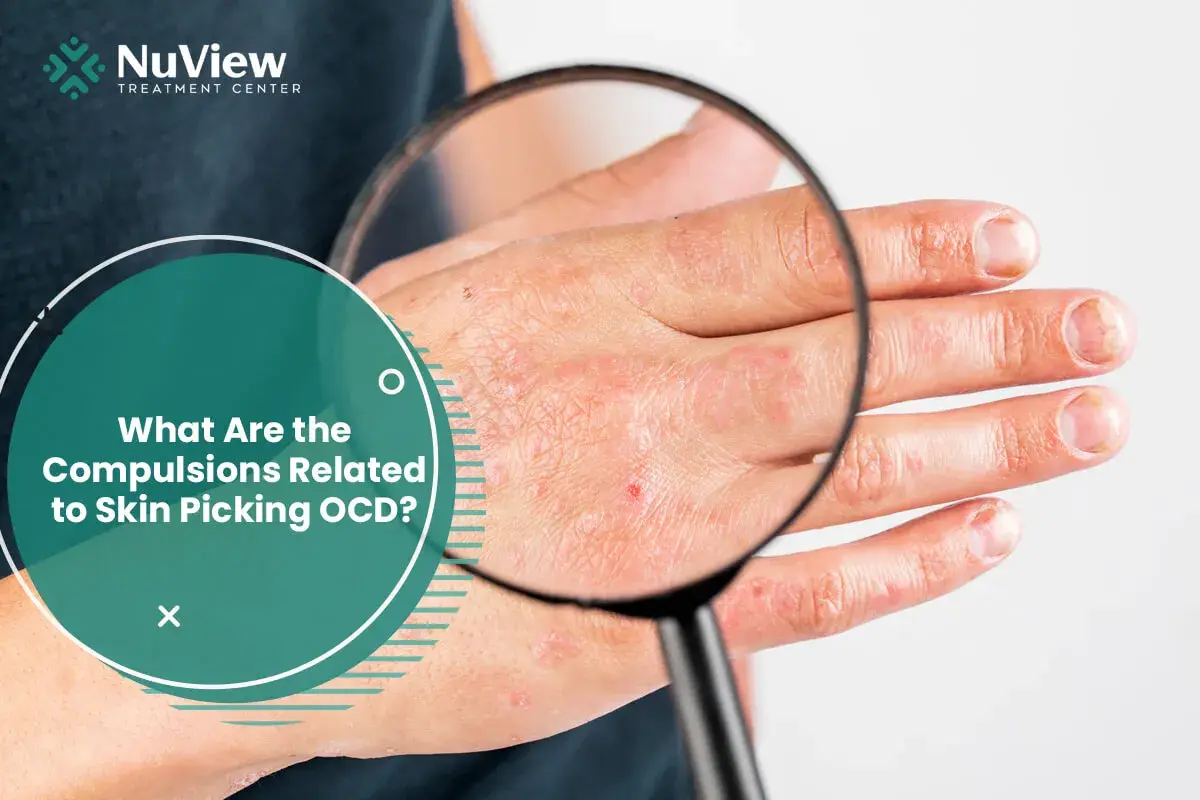
Compulsions related to asking picking skin picking OCD revolve around:
Skin Picking: The main compulsion is picking at the skin, driven by the obsessions mentioned earlier. This behavior provides temporary relief from obsessive thoughts and anxiety.
Attempts to Resist Picking: Some individuals try hard to stop picking, but they find it very challenging to do so successfully.
Hiding Skin Lesions: People with Skin Picking Disorder may go to great lengths to conceal the skin damage, using clothing, makeup, or other methods to cover up the lesions.
Protective Rituals: Certain rituals, like wearing gloves, may be used to prevent skin picking. These rituals are a way to counteract the compulsion.
What Causes Skin Picking OCD?
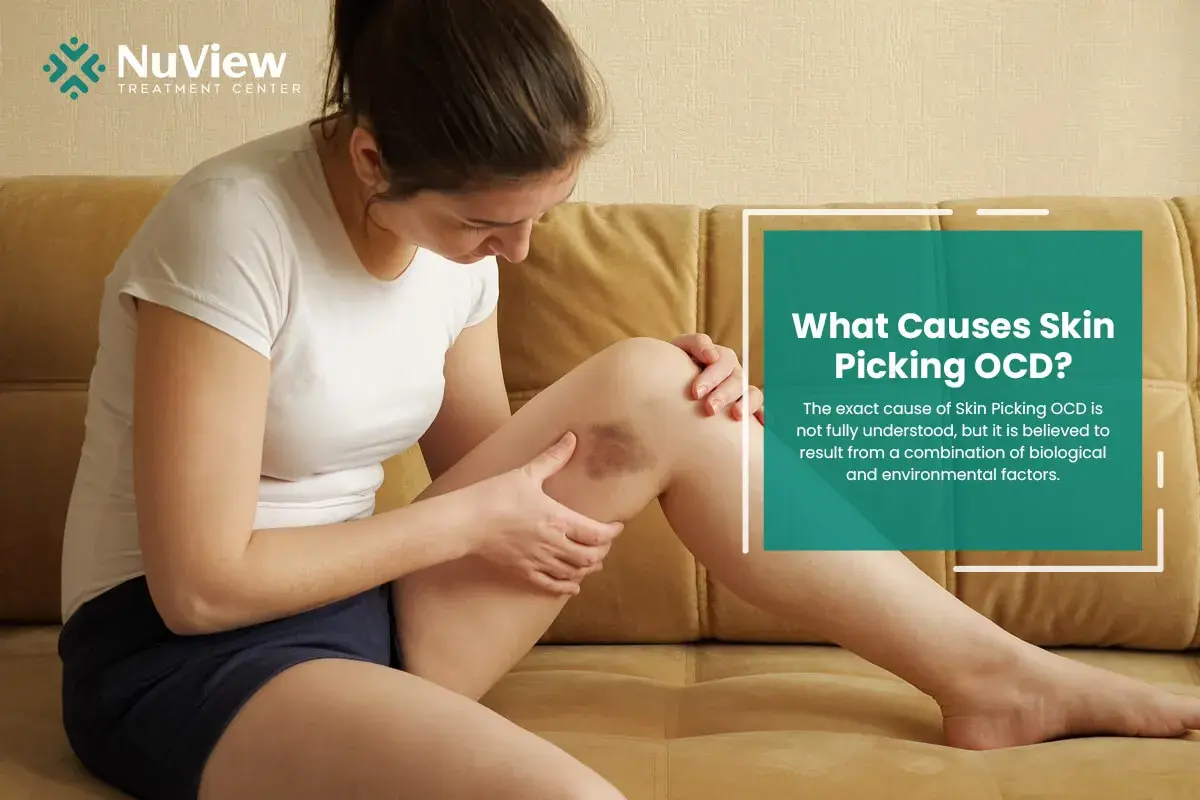
The exact cause of Obsessive Compulsive Picking Disorder is not fully understood, but it is believed to result from a combination of biological and environmental factors.
Research suggests that there may be a genetic predisposition to developing excoriation disorder, meaning it can run in families. Neurological factors, including brain structure and functioning, can also play a role in developing repetitive behaviors like skin picking.
Additionally, imbalances in brain chemicals (hormones), such as serotonin, have been implicated in various impulse control disorders, including this one.
Stress, anxiety, and negative feelings are common triggers for skin-picking behaviors. People may start picking as a way to cope with these emotions or as a response to specific life events.
Childhood experiences, trauma, or learned behaviors can also contribute to the development of excoriation disorder.
Excoriation disorder often co-occurs with other conditions like OCD and Dermatillomania, Body Dysmorphic Disorder (BDD), or Trichotillomania (hair-pulling disorder).
These related disorders share common underlying factors and may influence the development of skin-picking behaviors.
Skin picking can start as a habit and then become compulsive.
Frequent repetition of the act can lead to changes in the brain that make it difficult to stop. The behavior becomes a habit that is hard to break.
Get Started With Nuview Treatment Center
Is Skin Picking OCD Treatable?
Yes, Skin Picking OCD is treatable. Both pharmacological treatments and psychotherapy have shown effectiveness in managing this disorder.
Various comprehensive behavioral models have been developed to address the complex nature of skin-picking behaviors. These models often include awareness training, competing response training, and stimulus control to reduce the compulsive urge to pick.
Habit reversal therapy and commitment therapy are specific therapeutic approaches designed to target skin-picking behaviors and help individuals develop strategies to resist the urge to pick.
Medication may be considered in some cases, particularly selective serotonin reuptake inhibitors (SSRIs).
What Are the Medications Used to Treat Skin Picking OCD?
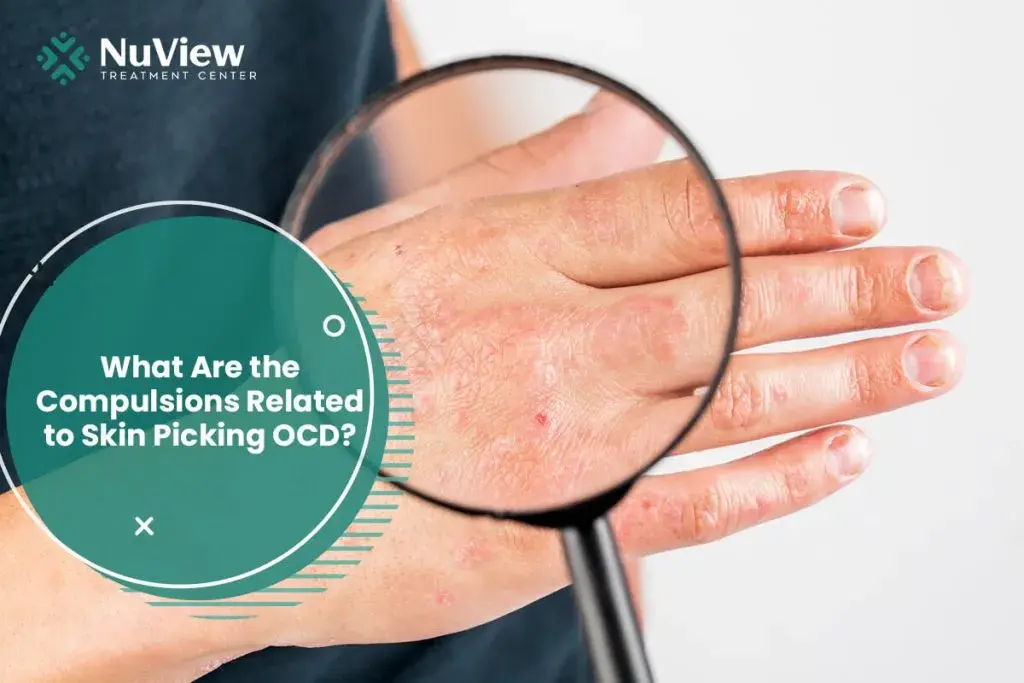
The primary class of medications used to treat Skin Picking OCD are selective serotonin reuptake inhibitors (SSRIs).
Medications can be a helpful part of the treatment plan for excoriation disorder, particularly when the condition is severe or significantly impacting an individual's daily life.
These antidepressant medications, including drugs like fluoxetine and sertraline, can help regulate serotonin levels in the brain, which are associated with mood and impulse control.
SSRIs may reduce the frequency and intensity of pathologic skin picking and alleviate the associated anxiety. A healthcare professional will determine the specific medication and dosage based on individual needs.
What Are The Therapies Used For Skin Picking Disorder Treatment?
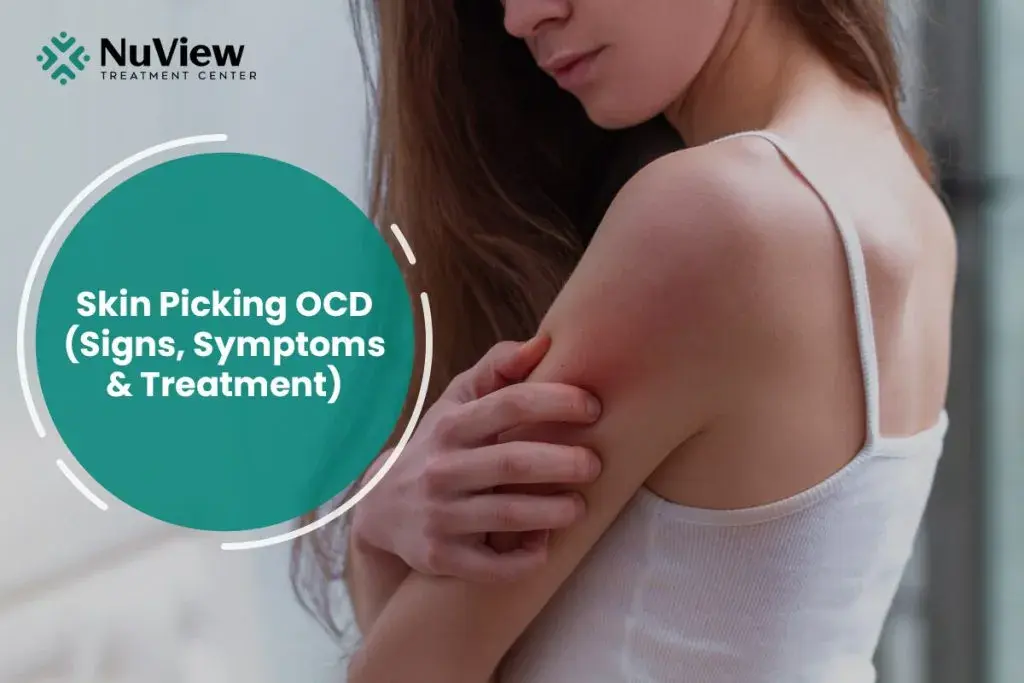
Therapies used to treat skin-picking OCD include cognitive behavioral therapy (CBT) and exposure and relapse prevention (ERP) therapy.
These therapies can be offered individually or as a comprehensive treatment plan. The choice of therapy may depend on the individual plan.
Does Skin Picking OCD Ever Go Away?
Skin Picking OCD can improve significantly with treatment, but it may not completely go away for some individuals.
The goal of treatment is typically to reduce the frequency and intensity of pathologic skin-picking behavior, improve overall functioning, and provide effective strategies to manage the compulsion.
The outcome can vary depending on individual factors, the condition's severity, and the treatment's consistency.
Early intervention and seeking professional help are essential steps towards managing Skin Picking Disorder and improving one's quality of life.
Reclaim Your Skin and Your Life with NuView Treatment Center
If you or someone you care about is struggling with Skin Picking OCD, NuView Treatment Center is here to help.
Our compassionate team of experts specializes in evidence-based therapies, including Cognitive-Behavioral Therapy (CBT) and Exposure and Response Prevention (ERP), to provide effective treatment for excoriation disorder.
Don't let skin-picking control your life any longer. Take the first step towards healing and recovery. Contact NuView Treatment Center today to schedule a consultation and start your journey towards healthier skin and improved well-being.
- What Is Dermatillomania?
- Is Skin Picking a Sign of OCD?
- Signs and Symptoms of Skin Picking Disorder
- What Causes Skin Picking OCD?
- Is Skin Picking Related To ADHD?
- Is Skin Picking OCD Treatable?
- Does Skin Picking OCD Ever Go Away?
- Reclaim Your Skin and Your Life with NuView Treatment Center
- What Is Dermatillomania?
- Is Skin Picking a Sign of OCD?
- Signs and Symptoms of Skin Picking Disorder
- What Causes Skin Picking OCD?
- Is Skin Picking Related To ADHD?
- Is Skin Picking OCD Treatable?
- Does Skin Picking OCD Ever Go Away?
- Reclaim Your Skin and Your Life with NuView Treatment Center
Get Help Today!
- Grant, Jon E., and Samuel R. Chamberlain. “Prevalence of Skin Picking (Excoriation) Disorder.” Journal of Psychiatric Research, vul. 130, 2020, pp. 57-60, https://doi.org/10.1016/j.jpsychires.2020.06.033. Accessed 18 Sept. 2023.
- Grant, Jon E., and Samuel R. Chamberlain. “Trichotillomania and Skin-Picking Disorder: An Update.” Focus: Journal of Life Long Learning in Psychiatry, vul. 19, no. 4, 2020, pp. 405-412, https://doi.org/10.1176/appi.focus.20210013. Accessed 18 Sept. 2023.
- NHS. “Skin Picking Disorder.” nhs.uk, 29 Mar. 2022, www.nhs.uk/mental-health/conditions/skin-picking-disorder.
- Substance Abuse and Mental Health Services Administration. “Impact of the DSM-IV to DSM-5 Changes on the National Survey on Drug Use and Health [Internet]”. Rockville (MD): Substance Abuse and Mental Health Services Administration (US); 2016 Jun. Table 3.28, Excoriation (Skin Picking) Disorder. Available from: https://www.ncbi.nlm.nih.gov/books/NBK519704/table/ch3.t28/
- Wiese, Andrew D., et al. “Habit Reversal Training for Excoriation Disorder: Differential Outcomes of Telehealth versus In-person Treatments.”Psychiatry Research Case Reports, vul. 2, no. 1, 2023, p. 100099, https://doi.org/10.1016/j.psycr.2022.100099. Accessed 18 Sept. 2023.
Everyone is Welcome Here and We All Have Your Back
Your healing journey deserves a personalized approach. At NuView, we integrate expertise in behavioral therapy, mental health, and substance use treatment to create a customized recovery plan tailored to your unique needs.
Connect with our Admissions Specialists today.
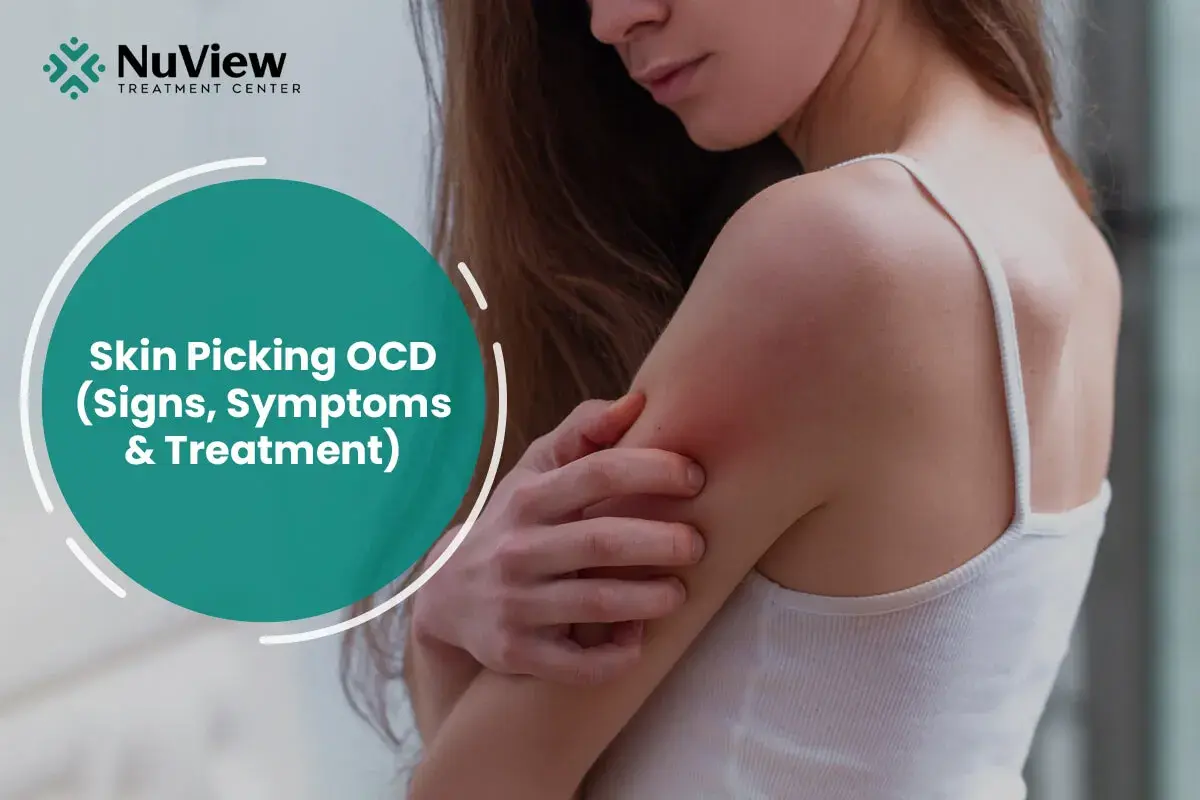


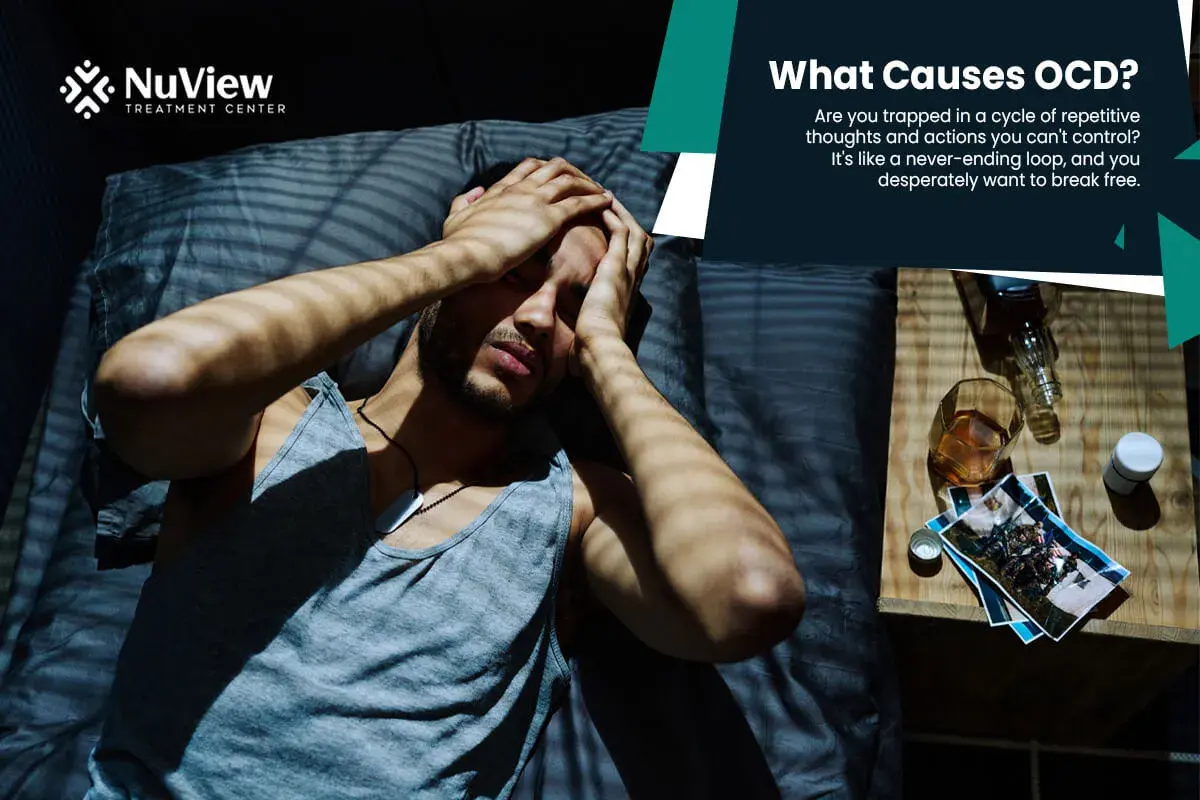



Written By
Dr. Ryan Peterson